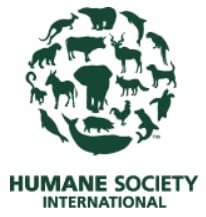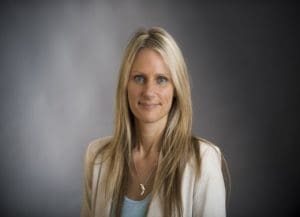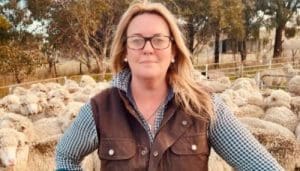 EUROPEAN Union ministers have been urged to seek equivalency on animal welfare standards from Australia by a group seeking to ban the mulesing of sheep, as the EU-Australia Free Trade Agreement continues to be negotiated.
EUROPEAN Union ministers have been urged to seek equivalency on animal welfare standards from Australia by a group seeking to ban the mulesing of sheep, as the EU-Australia Free Trade Agreement continues to be negotiated.
Animal welfare and conservation organisation Humane Society International Australia firmly believes the EU should be seeking equivalency on animal welfare standards from Australia.
HSI Australia is also running an online campaign urging supporters to call on Australia’s state and federal agriculture ministers to support an urgent update of sheep welfare standards to require a phase out of mulesing by 2030.

HSI Australia animal welfare campaigner Georgie Dolphin
HSI Australia’s animal welfare campaigner Georgie Dolphin said the ‘Australian Animal Welfare Standards and Guidelines for Sheep’ are weak because they still allow wool producers to practice mulesing without pain relief.
“As consumers are increasingly concerned by animal welfare issues, many are keen to proactively engage where possible to prompt change.
“Through HSI Australia’s latest action, supporters can contact the Federal Agriculture Minister together with all state and territory Agriculture Ministers calling on them to support an urgent update of the sheep welfare standards to require a phase out of mulesing by 2030,” she said.
“They are also calling for pain management for all invasive procedures on lambs immediately, including tail docking, castration, and pre- and post-mulesing.”
Ms Dolphin said the mulesing issue has drawn negative attention in Australia’s recent free trade negotiations with the United Kingdom and the EU.
“HSI Australia has presented to the EU parliament on the issue and has been corresponding and meeting with appropriate ministers to urge this change.
“A 2030 deadline to end mulesing is a realistic and achievable industry target,” she said.
“The sooner we see this legislation in place to fast-track this progress, the better, for both the welfare of millions of lambs as well as for the Australian wool industry’s reputation.”
HSI EU held a forum in the EU Parliament on 23 May to discuss animal welfare in the EU/Australia FTA. It was hosted by a Member of the European Parliament and attended by Australian and EU negotiators.
HIS Australia’s head of campaigns, Nicola Beynon, presented alongside Dr Joanna Swabe, senior director of public affairs for HSI/Europe, as well as representatives of animal protection non-government organisations.
Ms Dolphin said Ms Beynon highlighted that Australia is already lagging behind the EU when it comes to its farm animal welfare standards. The forum discussed how the EU is considering further strengthening its standards for farm animal welfare, that could see Australia fall further behind, HSI said.
Ms Beynon explained that it is imperative Australia’s federal, state and territory governments start paying attention to what the animal welfare scientists, animal protection organisations and concerned citizens are saying about meeting the welfare needs of farm animals, Ms Dolphin said.
“They must take urgent action to revamp our own animal welfare laws and standards with the same kind of level of ambition that our European trading partners are showing.”
In regard to mulesing, Ms Beynon proposed that the best solution for Australian wool producers is to breed flystrike resistant sheep and undertake an urgent review of Australia’s National Standards and Guidelines for Sheep to address the practice.
“Animal welfare is certainly being raised as a priority issue by the EU and concern over this issue does nothing to assist Australia in the FTA negotiations.”
HSI Australia said its call for support to update Australian animal welfare legislation has only just been launched, but a separate action to encourage retailers to phase out mulesed wool from their supply chains has secured more than 5000 sign-ons.
Ms Dolphin said HSI Australia will seek policies to end mulesing and for mandatory pain relief pre and post cut from all parties at all relevant elections. HSI Australia has recently submitted to Labor’s draft National Platform calling for an overhaul of Australia’s animal welfare standard setting processes.
“We want to see a reformed process that is independent and timely, keeping up with science and community expectations, and so that outdated painful practices like mulesing can be phased out.”

WoolProducers Australia CEO Jo Hall.
No equivalencies on animal welfare with EU – WoolProducers
WoolProducers Australia chief executive officer Jo Hall said the body has made our position regarding the EU FTA well known to the government, “being that we will not accept any agreement to equivalencies in standards regarding a number of issues including animal welfare.”
“We expect that the Australian government will continue to advocate for Australian industries and producers, making the point that our production systems and animal husbandry procedures are appropriate to our geographical, production and climatic conditions.
“WoolProducers encourages wool growers to adopt best practice standards in animal husbandry procedures and supports a culture of continual improvement in animal welfare which can be proven with data collected under the Sheep Sustainability Framework,” she said.
“WoolProducers supports the Sheep Animal Welfare Standards and Guidelines and will be involved in any revision of the document when that occurs; however, we are strongly opposed to any government intervention to ban mulesing until there is a universally acceptable alternative.
“Any organisation that thinks that setting an arbitrary date to ban the practice will lead to good animal welfare outcomes, doesn’t understand animal welfare, mulesing or the industry.”
A Department of Agriculture, Fisheries and Forestry spokesperson said Australia has its own high standards for animal welfare that are appropriate to the country’s systems.
“We have been working with the EU on appropriate provisions on cooperation and information sharing.”

Jo Hall – I know of some Merino wool producers who are not mulesing. Are you saying they have not found an acceptable alternative?
Jonathan Lillie – I too know growers that have successfully ceased mulesing through genetic selection, which is great for their own enterprise and obviously suits their production and climatic conditions. I also know growers that ceased mulesing and had to return to the practice due to seasonal issues and animal welfare reasons. Growers are encouraged to look to genetics as the solution to this issue and there are many great resources available to assist growers with this. However, I also know many growers are at different stages of this process and some haven’t started on this path. While I understand that some of our customers have concerns over the practice of mulesing, setting a random date to cease mulesing not based on a clear strategy would lead to perverse animal welfare and industry outcomes. Further, I know that aligning with animal rights groups is a very short term strategy that will ultimately not end well for anyone in the trade, not just the growers.
It’s very simple. Just select for a thin loose skin with small suint glands. It’s the fluid suint on the fibre when rain comes in a blowfly season that attracts blow flies. CSIRO discovered this in the 1940s and they researched this in the 1980s. They came up with the same answer with a completely different team. How long does it take for educated people to get it? Or is it political? Are governments, universities, departments of agriculture, corporate businesses and farm organisations pursuing bad animal welfare by encouraging people not to take advice from the nation’s leading research organisation, including Mr Mules? He recommended that while we develop the sheep suggested by CSIRO that we trim the excess skin from sheep’s tails.
Growers have been changing their land use away from merino sheep that are blowfly attractants as they haven’t had sufficient genetic gain in their flocks for such traits as blow fly resistance and the need for better lamb survival — 170 million sheep down to 70 million. These new genetics are out there. A flock can be changed quickly with the right guidance. The next generation doesn’t want to be cutting skin of lambs’ tails and chasing body strike while their mates are going home from their day job to a manicured garden and nice home. Please stop pushing the next run of farmers away and adopt the new technology of Merino breeding with high lamb survival and highly blowfly resistant Merinos.
How many times have wool growers committed themselves in the past to deadlines for the cessation of mulesing?
How many times have weasel words been spoken by various wool-growing groups about their high standards of sheep welfare while at the same time ignoring the widespread practice of mulesing (even without pain relief) on the ground of economic necessity?
In the face of these negative consequences here and abroad, why does the industry continue to ignore available and viable alternatives to mulesing when their adoption would effectively obviate the insufferable pain inflicted on sheep by mulesing and thereby ensure — even retrieve — a positive image for the industry here and abroad. One alternative technique or treatment in particular is known as freeze branding (FB) using liquid nitrogen. It is a technique similar to that used by family GPs to remove skin growths such as warts and keratosis from human skin. It causes mild stinging on application, but no trauma. When applied to sheep around the breech and tail area it causes the exposed skin to drop off and leave a bare area of stretched scar tissue similar to the effect of mulesing. But no cutting of skin or flesh, nor blood letting, is involved. The area is thereafter protected against fly-strike for the sheep’s lifetime..
The holy grail sought by the industry would be an ability to breed out the susceptibility to fly strike of merino sheep in affected conditions, where the bulk of the flock is found. That is a quest which has been ongoing for decades, but has, in fact, achieved very little in that regard. There is more hope for climate change.
Sooner or later the fine wool trade will lose its market altogether thanks to the above obstinacy against the growing market challenge coming from the animal welfare lobby with increasing public support. Legislation is not the answer, unless crafted in such a way as to remove the easy-come-easy-go approach that wool growers have to mulesing, and to incentivise the adoption of measures that at best remove the need for mulesing or at the least minimise or eliminate the infliction of pain on sheep for the sake of profits at the margin.